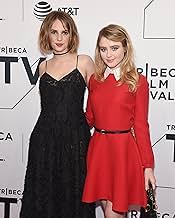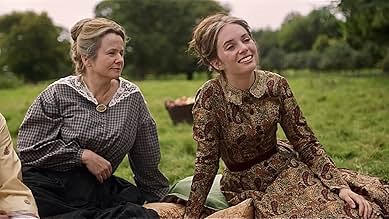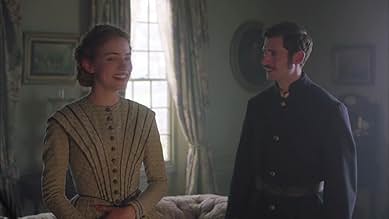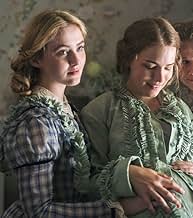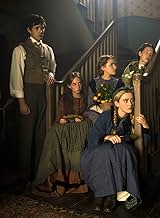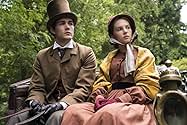Dramatización de la novela de Louisa May Alcott sobre las vidas de las cuatro hermanas March durante la Guerra Civil Americana mientras aprenden a navegar por el amor, la pérdida y las prueb... Leer todoDramatización de la novela de Louisa May Alcott sobre las vidas de las cuatro hermanas March durante la Guerra Civil Americana mientras aprenden a navegar por el amor, la pérdida y las pruebas del crecimiento.Dramatización de la novela de Louisa May Alcott sobre las vidas de las cuatro hermanas March durante la Guerra Civil Americana mientras aprenden a navegar por el amor, la pérdida y las pruebas del crecimiento.
- Premios
- 3 premios ganados y 7 nominaciones en total
Explorar episodios
Opiniones destacadas
The performances of the young performers are so wooden. It lacks spirit. Disappointing.
7lthd
Amy was played by a 20 year old actress playing a twelve year old child. She was obviously too old, yet they insisted that she milk her childish ways (can you tie my skate, marmie says I'm old enough to do my own hair, etc.) to the point where I was actually laughing at scenes that weren't intended to be funny. Drug store box bleached hair (it was a ghastly shade of yellow), not a fitting actress for the part in any way. Enough said, Amy was everything that was bad about this film, well, almost.. They completely skipped the plays and left Jo and Laurie full drama.
To those who say this film is to the book, I ask, what book did you read? Some say they should have used British actresses. Why would they do that for a tale that took place in Massachusetts during the Civil War?
Did. I love it ? Yes! I just acknowledge that there were parts I couldn't get past.
Though I thought Beth had a bit of overkill, I thought the actress was fantastic and clearly played on the directors vision. She is a fantastic actress. I preferred Claire Danes but this woman (let's face it, she's over 20) is a brilliant actress. I think that the actress that played Marmie was possibly the best of anyone that I have seen tackle the part. She pulled raw emotion from me in a way that Susan Sarandon didn't (even though I loved her in the part). The real show stopper was Maya Hawke, as Jo. She was everything that is Jo for me. It was like she had leaped from the page. I loved her on Stranger Things and have been a fan of her mother and father ever since I was a child.
I loved that they led up to Jos Boys. I think in all they did a fantastic job, but I think That they should have sucked it up and used 2 actresses for Amy, and not this one. She didn't fit the part.
Unlike many classic adaptations the BBC has released in the past, problem after problem weighs down Little Women and stops the series from being a truly enjoyable watch.
The book itself is largely written in a sweet, innocent voice/tone, and it works well within the text. However, when translating or trying to capture that same voice or spirit in actual dialogue for the screen, it comes off as amateurish or overly sentimental when spoken aloud. The text's tone is actually one of the reasons why this book is difficult to adapt. It is not the acting that lets the series down, rather it is the words that are unbelievable. People simply don't/didn't speak in such a way, even in the Victorian period. If this version is trying to modernize the girl's characters/eccentricities and the story's main message, why could it not modernize the language a bit or be a little more age appropriate- of course, still keeping it in line with the book's tone. An adaptation of Little Women should strike a balance between the two parts of the girls' and Laurie's journey into adulthood. First, establishing the way things are and have always been in the March home in a playful tone, and then, as they are forced to change through the circumstances of life and love, the tone becomes more heartwarming and more mature. From the get-go, this version applies a serious and mature tone despite the language used and the children's level of maturity, so, there is never a real transformation in character/perspective for any of the children, only in the circumstances they find themselves in.
Another glaring problem is the editing and structuring of the plot. Simply put, many scenes are too short; the scenes are like snapshots; they tell the basic story from a surface, visual level, but it lacks any depth, detail, or real explanation. This version misses the opportunity, being that it is longer and has more time, to include parts that have been left out of adaptations before it- parts that develop or establish the characters, their relationships, and their motives (examples, Jo visiting Laurie when ill, meeting Mr. Lawrence, Laurie's backstory and mother, the girls engaging in Jo's plays, Laurie joining in). Actually, this version excludes more than it adds, which is a little baffling. How can so much be glossed over?
The last problem is the accompanying score. If I am not mistaken, the music used within the series seems to be lifted from or inspired by the Radio 4 play of Little Women. Which is an odd choice, being that it is not of the period. Adding a modern score can work, but here, it is a miss-match.
Though the 94 film has its faults as well, it remains the best crack at adapting Alcott's work, which is disappointing seeing that the BBC had so much potential.
The book itself is largely written in a sweet, innocent voice/tone, and it works well within the text. However, when translating or trying to capture that same voice or spirit in actual dialogue for the screen, it comes off as amateurish or overly sentimental when spoken aloud. The text's tone is actually one of the reasons why this book is difficult to adapt. It is not the acting that lets the series down, rather it is the words that are unbelievable. People simply don't/didn't speak in such a way, even in the Victorian period. If this version is trying to modernize the girl's characters/eccentricities and the story's main message, why could it not modernize the language a bit or be a little more age appropriate- of course, still keeping it in line with the book's tone. An adaptation of Little Women should strike a balance between the two parts of the girls' and Laurie's journey into adulthood. First, establishing the way things are and have always been in the March home in a playful tone, and then, as they are forced to change through the circumstances of life and love, the tone becomes more heartwarming and more mature. From the get-go, this version applies a serious and mature tone despite the language used and the children's level of maturity, so, there is never a real transformation in character/perspective for any of the children, only in the circumstances they find themselves in.
Another glaring problem is the editing and structuring of the plot. Simply put, many scenes are too short; the scenes are like snapshots; they tell the basic story from a surface, visual level, but it lacks any depth, detail, or real explanation. This version misses the opportunity, being that it is longer and has more time, to include parts that have been left out of adaptations before it- parts that develop or establish the characters, their relationships, and their motives (examples, Jo visiting Laurie when ill, meeting Mr. Lawrence, Laurie's backstory and mother, the girls engaging in Jo's plays, Laurie joining in). Actually, this version excludes more than it adds, which is a little baffling. How can so much be glossed over?
The last problem is the accompanying score. If I am not mistaken, the music used within the series seems to be lifted from or inspired by the Radio 4 play of Little Women. Which is an odd choice, being that it is not of the period. Adding a modern score can work, but here, it is a miss-match.
Though the 94 film has its faults as well, it remains the best crack at adapting Alcott's work, which is disappointing seeing that the BBC had so much potential.
I've enjoyed every adaptation of Little Women that I've seen, and this was no exception. As someone who enjoys comparing adaptations across time, I find the story told in this newer style of acting, directing, music etc. a valuable addition to the collection. Some people may not like aspects such as scenes of the Civil War where Father is, and this is the first time we see any of Meg's labour, but for me neither is excessive and both are worth including.
This adaptation isn't perfect, any more than its predecessors are perfect, but let me not list my small gripes here. I found it overall well written, well acted and well cast. The descriptions of the characters were clearly considered when casting (if not 100% adhered to), which is a nice touch and the cherry on top of the actors' generally fine performances. In particular I found Meg engaging, Aunt March very satisfying and Laurie almost straight from the pages of the book, while Father is (I feel) a loyal interpretation yet unlike any I have seen before.
This adaptation isn't perfect, any more than its predecessors are perfect, but let me not list my small gripes here. I found it overall well written, well acted and well cast. The descriptions of the characters were clearly considered when casting (if not 100% adhered to), which is a nice touch and the cherry on top of the actors' generally fine performances. In particular I found Meg engaging, Aunt March very satisfying and Laurie almost straight from the pages of the book, while Father is (I feel) a loyal interpretation yet unlike any I have seen before.
Little Women (TV Mini-Series 2017) was a BBC/Masterpiece Theater production directed by Vanessa Caswill. This novel lends itself to the world of cinema, and many good versions are available. However, I liked this one best.
Maya Hawke does very well as Jo, which couldn't have been easy, because she's very beautiful and Jo is supposed to be the plain one. Kathryn Newton plays Amy March, who is beautiful but "willful." Willa Fitzgerald portrays Meg March, the most beautiful and most conventional sister. Annes Elwy plays Beth, who is extremely shy. Elwy is Welsh, and speaks Welsh, but I didn't hear any accent when she played the role.
Angela Lansbury plays Aunt March perfectly. Believe it or not, I thought she was even better than Maggie Smith(!).
Mark Stanley plays Professor Bhaer, which is a difficult role. Directors have protrayed Professor Bhaer as old and stodgy, in which case you wonder what Jo had in mind. Other directors have made the character young and handsome, and so Jo's choice is a no-brainer. I think director Caswill got this casting exactly right. Somewhat older, but not stodgy, and just handsome enough to attract a young woman like Jo.
My favorite actor in the movie was Emily Watson who played Marmee. She is a highly experienced English actor. (Again, no trace of an accent.) She looks like the character she portrays--saddened and toughened by a life of genteel poverty. Raising four very different daughters on her own could not have been easy, but Watson allows us to believe she could do it. Just her work alone would be enough to make me recommend the movie.
This version of Little Women was made for TV as a three-part miniseries. Three hours of screen time gave director Caswill the opportunity to address most of the many plot lines in the novel. We saw the movie on DVD, and we could have watched it as a single long movie. However, we watched it in three one-hour episodes, as intended by the producers. Either way will work.
Little Women has a pretty good IMDb rating of 7.2. I thought that it was much better than that, and rated it 9.
Maya Hawke does very well as Jo, which couldn't have been easy, because she's very beautiful and Jo is supposed to be the plain one. Kathryn Newton plays Amy March, who is beautiful but "willful." Willa Fitzgerald portrays Meg March, the most beautiful and most conventional sister. Annes Elwy plays Beth, who is extremely shy. Elwy is Welsh, and speaks Welsh, but I didn't hear any accent when she played the role.
Angela Lansbury plays Aunt March perfectly. Believe it or not, I thought she was even better than Maggie Smith(!).
Mark Stanley plays Professor Bhaer, which is a difficult role. Directors have protrayed Professor Bhaer as old and stodgy, in which case you wonder what Jo had in mind. Other directors have made the character young and handsome, and so Jo's choice is a no-brainer. I think director Caswill got this casting exactly right. Somewhat older, but not stodgy, and just handsome enough to attract a young woman like Jo.
My favorite actor in the movie was Emily Watson who played Marmee. She is a highly experienced English actor. (Again, no trace of an accent.) She looks like the character she portrays--saddened and toughened by a life of genteel poverty. Raising four very different daughters on her own could not have been easy, but Watson allows us to believe she could do it. Just her work alone would be enough to make me recommend the movie.
This version of Little Women was made for TV as a three-part miniseries. Three hours of screen time gave director Caswill the opportunity to address most of the many plot lines in the novel. We saw the movie on DVD, and we could have watched it as a single long movie. However, we watched it in three one-hour episodes, as intended by the producers. Either way will work.
Little Women has a pretty good IMDb rating of 7.2. I thought that it was much better than that, and rated it 9.
¿Sabías que…?
- TriviaDirector Vanessa Caswill expanded on the idea that historical accuracy and period authenticity was paramount. "We asked them to grow their underarm hair, because that would have been authentic, and not to have visible make-up because they wouldn't have worn any," she says. (Little Women Production Notes)
- ErroresIf Jo is old enough to attend an evening party, she would not be wearing her hair in a long braid, but up in the severe, center-parted styles of the period. Being old enough to put one's hair up and go to parties was an important rite of passage into adulthood, and even someone as unconventional as Jo would not have attended a social function with her hair down.
- ConexionesFeatured in The South Bank Show: Heidi Thomas (2019)
Selecciones populares
Inicia sesión para calificar y agrega a la lista de videos para obtener recomendaciones personalizadas
- How many seasons does Little Women have?Con tecnología de Alexa
Detalles
- Fecha de lanzamiento
- Países de origen
- Idioma
- También se conoce como
- Маленькі жінки
- Locaciones de filmación
- Productoras
- Ver más créditos de la compañía en IMDbPro
Contribuir a esta página
Sugiere una edición o agrega el contenido que falta



